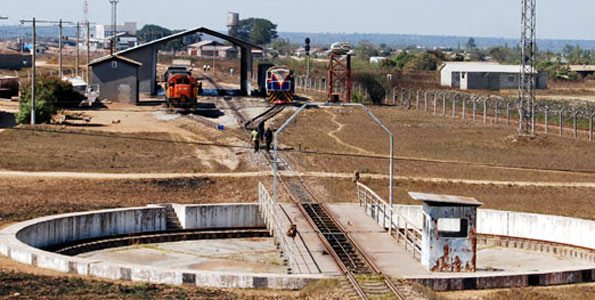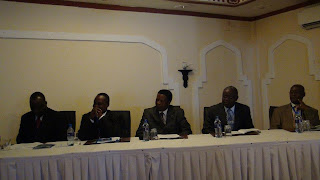The development of the community goes with the development of infrastructure and of course the people. If we are looking ahead, East Africa must develop common infrastructure. I have said in column that it is the Kenyan business people who are driving the community. It is not surprising that Kenya is growing alone on the broad gauge railway. The article below will give you the details...
Kenya, China quietly strike deal on modern railway line
Kenya has turned to China to fund the building of a new standard gauge railway line between Mombasa and Nairobi, potentially upsetting current infrastructure arrangements with its neighbors.
The railway line, which is to be built according to Chinese railway design standards, will carry freight trains at speeds of up to 80 kilometres per hour, and passenger trains at up to 120 kilometres per hour.
It will be completed in five years, with the cost of the track alone estimated at a massive $2.6 billion.
Away from the limelight, the Chinese construction company — China Roads and Bridges Company — has already signed a commercial contract with the Kenya Railways Corporation, under an arrangement that commits the state-owned company to deal only with the Chinese company.
Naturally, Uganda — one of the biggest users of the Mombasa Port — as well as Rwanda and Burundi, will be following the dealings between China and Kenya closely.
The viability of the new standard gauge railway is based on the assumption that it will be part of a seamless system connecting Kenya and Uganda, and also serving landlocked Rwanda and Burundi.
The new deal will have far-reaching implications for the existing concession agreed to with Rift Valley Railway in both Uganda and Kenya.
Under the current agreement, RVR’s interests are guaranteed by clauses that stipulate that the governments of Kenya and Uganda cannot — during the tenure of the concession — introduce changes that jeopardize RVR’s profitability.
The new plan is that the Chinese-built railway will be operated under an arrangement known as “open access,” where multiple operators will be allowed to operate freight businesses on the standard gauge railway system in competition with RVR.
Kenya and Uganda could find themselves in court battling it out with RVR over access to the new railway line.
Kenya has stepped up diplomatic activity to include Uganda in its dealings with the Chinese and secure support for the new railway. Two weeks ago, the two countries negotiated a new bilateral deal on the standard gauge railway system.
Alternative routes
Meanwhile, Tanzania and Uganda have been seeking to expedite the construction of Tanga-Musoma railway line through the Central corridor in Tanzania to link Tanga and Dar es Salaam ports.
Since Kenya’s 2007-08 post-election violence, Uganda has been trying to open a reliable southern route to the coast, to avoid the recurrence of the damage to the Uganda economy witnessed then. Kenya, the EAC partner state that is Uganda’s main transit route, goes to the polls next year.
Tanzania already has sections of its railway on the broad gauge Uganda appears to be left out in the cold. Read the article below...
Tanzania and Zambia are set to complete 12 new projects worth $42 million after securing funding from China under their joint railway, Tazara.
Officials from the two countries said the funding under the Tanzania-Zambia Railway Authority (Tazara) gives the firm the financial muscle to execute the projects agreed in March by China, Tanzania and Zambia under the 15th Economic and Technical Co-operation Protocol.
Akashambatwa Mbikusita-Lewanika, managing director of Tazara, said the new projects include the rehabilitation of 42 passenger coaches and supply of four new main line locomotives, two shunting locomotives and rescue and lifting equipment.
More than rails
Other projects will address the supply of track trolleys, assorted spare parts and training of railway staff.
Tanzania and Zambia recently committed to providing funding to the struggling Uhuru Railway so that it can settle outstanding terminal and pension benefits for its workers.
The economic and technical support under the 15 protocols signed so far is what has kept Tazara going while awaiting for much needed recapitalisation, reconstruction and restructuring by the shareholding governments of Zambia and Tanzania.
Once fully executed, the projects are expected to greatly enhance Tazara’s capacity, doubling the number of locomotives in operation by the year 2015.
Currently there are, on average, only 10 main line locomotives available daily, for main line activities covering the entire 1,860km railway, stretching from Dar es Salaam, Tanzania to New Kapiri Mposhi in Zambia.
“We need to ensure that Tazara is able to provide guaranteed service, acquire new engines and maintain existing ones” said Tanzania’s Minister for Transport Harrison Mwakyembe.

.png)






